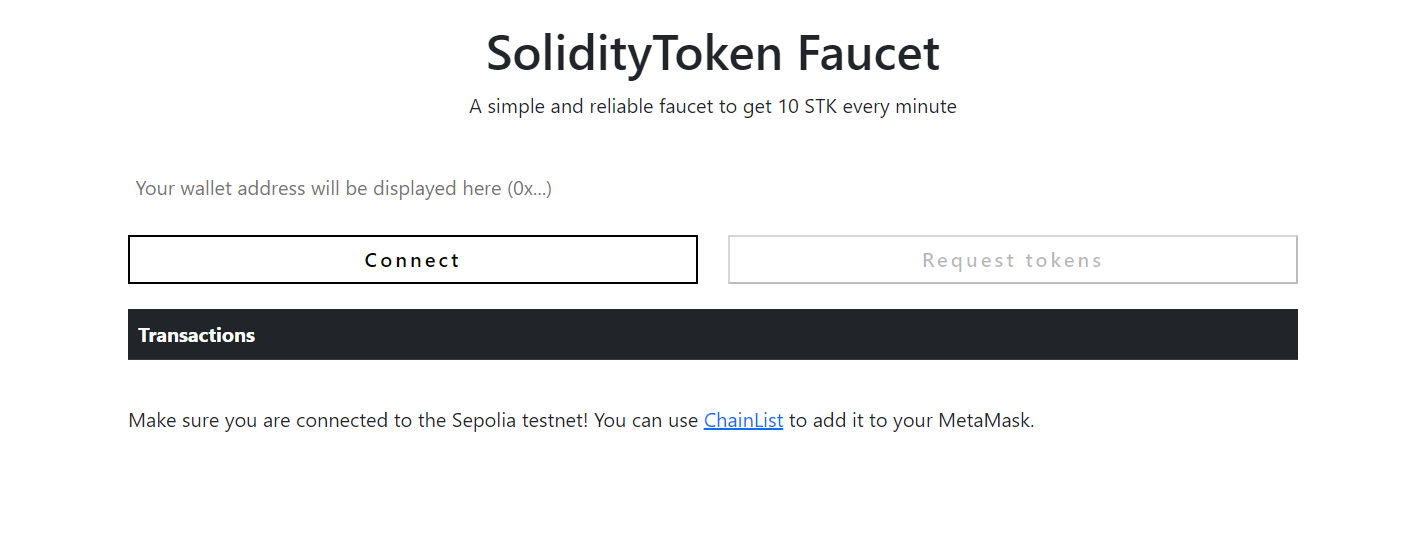Final project for "Alchemy University, The Ethereum Developer Bootcamp". Took also inspiration from the "ERC20 Tokens by Block Explorer" series.
This project aims to create a token called "SolidityToken $STK". The tokens are then distributed to users who request them from the faucet. Contracts built with Hardhat. UI built with Ethers and Browserify.
| Index |
|---|
| Project Layout |
| Gas optimizations |
| Tests |
| Deploy the contracts |
| SolidityToken Faucet UI |
There are three main folders:
contracts/contract- contains the solidity contractscontracts/test- contains test for the solidity contract of the ERC20 tokenstkfaucet-ui/- contains the ui
The following gas optimizations were implemented in the contracts.
- x += y costs more gas than x = x + y for state variables
- Description: Gas can be saved by substituting the addition operator with plus-equals, same for minus
- References:
- Use of assembly to check for address(0)
- Description: By checking for
address(0)using assembly language, you can avoid the use of more gas-expensive operations such as calling a smart contract or reading from storage. This can save 6 gas per instance. - Reference:
- Description: By checking for
- Mark payable functions guaranteed to revert when called by normal users
- Description: If a function modifier, like onlyOwner, is applied, the function will revert if a regular user attempts to pay it. Making the function payable will save valid callers money on gas since the compiler won't do checks to see if a payment was made.
The extra opcodes avoided are
CALLVALUE(2),DUP1(3),ISZERO(3),PUSH2(3),JUMPI(10),PUSH1(3),DUP1(3),REVERT(0),JUMPDEST(1),POP(2)which costs an average of about 21 gas per call to the function, in addition to the extra deployment cost. - Reference:
- Description: If a function modifier, like onlyOwner, is applied, the function will revert if a regular user attempts to pay it. Making the function payable will save valid callers money on gas since the compiler won't do checks to see if a payment was made.
The extra opcodes avoided are
- Install dependencies using the following command
npm install
- Add a
.envfile using either the dummy keys provided in.env.exampleor your own - To run all the tests for the contracts, use the following command
npx hardhat test --network hardhat
- From the contracts folder, follow the following steps
- Use the following command to deploy
SolidityToken.solon the Sepolia testnetnpx hardhat run --network sepolia scripts/deploySolidityToken.js
- Copy the address displayed in the terminal as a result. Paste it in
deployFaucet.jsin5: const contract = await Contract.deploy("ADDR-SOLIDITYTOKEN");
- Use the following command to deploy
Faucet.solon the Sepolia testnetnpx hardhat run --network sepolia scripts/deployFaucet.js
A version of Faucet is already deployed at 0x8e830f030a1a9094bbb6ae779879177f65a47f81 and a version of SolidityToken is deployed at 0x16e41846e3be94bd529afa9b475899bd15d88bc1 on the Sepolia testnet.
Host the project in the stkfaucet-ui directory on a server. If you're using Visual Studio, you can use the Live Server extension.
dist/bundle.js is generated using Browserify with the following command
browserify src/index.js --standalone bundle -o dist/bundle.js
